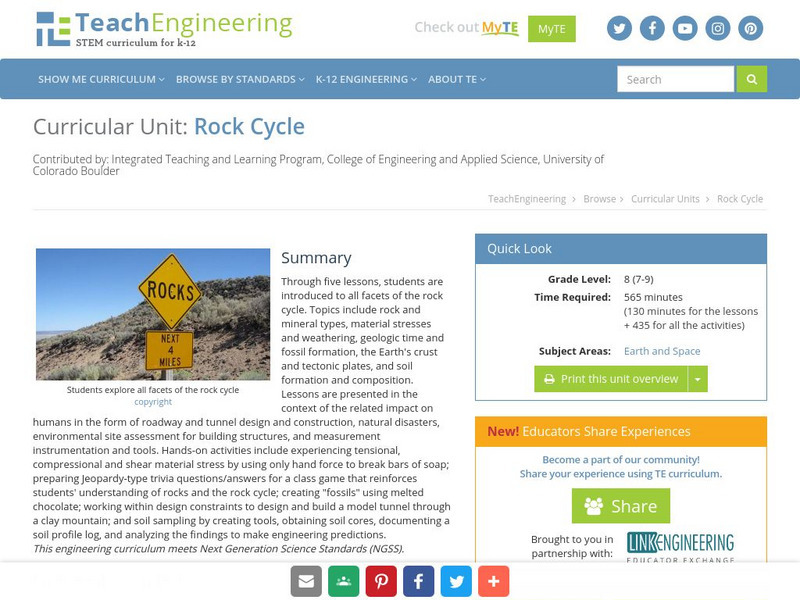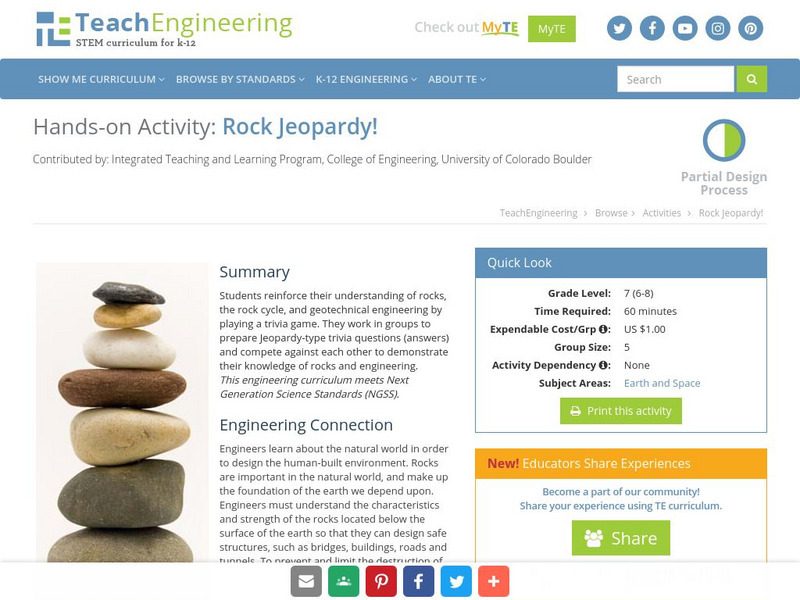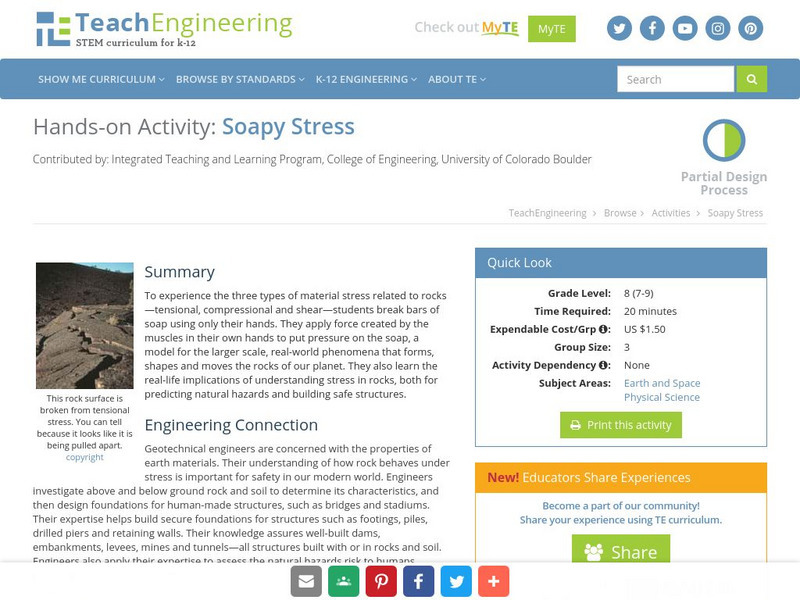Hi, what do you want to do?
Curated OER
Plate Tectonics: Sixth Grade Lesson Plans and Activities
Here is a set of pre-lab, lab, and post-lab lesson plans on plate tectonics. After completing the previous labs on volcanoes and earthquakes, sixth graders use the gained knowledge to explore plate boundaries and the movement of...
Curated OER
What's Under My Feet?
Young scholars choose one rock from a collection of igneous, metamorphic, and sedimentary rocks. They use multiple resources to create an informational brochure highlighting their rock. The brochures are combined into a class rock museum...
Curated OER
Geology: Famous Rock Groups
Fourth graders, in groups, use books to identify types of rocks. They examine the rocks and complete rock evidence charts. Students compose definitions for each rock type and determine uses for igneous rocks by early mankind.
Curated OER
Water: Naturally Cleaned
Students use stream trays covered in different types of rocks or soil to investigate infiltrates and runoff. In this water pollution instructional activity, students work in groups with stream trays that have different substrates. They...
Curated OER
Determining the Age of Fossils
Students examine the concept of radioactive dating. In this radioactive dating lesson plan, students investigate how to determine the ages of fossils and rocks as they learn about half-life radioactive decay.
Curated OER
Chemistry: Changing Materials
Students examine physical change with different temperature and solvents. In this elements and compounds lesson, students conduct experiments to discover what happens to the mass of a substance when is undergoes a physical change.
Curated OER
Bell Live! The Great Lakes: A Superior Adventure
Students participate in a virtual field trip to Lake Superior. In groups, they perform experiments in which test the level of toxins and bacteria in the water. They also watch video segments life in the lake and discuss their observations.
TeachEngineering
Teach Engineering: Making & Breaking: The Rock Cycle
Middle schoolers learn the components of the rock cycle and how rocks can change over time under the influence of weathering, erosion, pressure and heat. They learn about geotechnical engineering and the role these engineers play in the...
TeachEngineering
Teach Engineering: Rock Cycle
Through five lessons, students are introduced to all facets of the rock cycle. Topics include rock and mineral types, material stresses and weathering, geologic time and fossil formation, the Earth's crust and tectonic plates, and soil...
TeachEngineering
Teach Engineering: Rock Jeopardy!
Students reinforce their understanding of rocks, the rock cycle, and geotechnical engineering by playing a trivia game. They work in groups to prepare Jeopardy-type trivia questions (answers) and compete against each other to demonstrate...
Other
Digital Library for Earth System Education: Teaching Box: Mountain Building
A suite of lessons focusing on all aspects of how mountains are formed. Inquiry-based exploration of mountain building includes the rock cycle, mountain formation, plate tectonics, earthquakes, volcanoes, erosion, rocks, minerals, and...
TeachEngineering
Teach Engineering: Rock Solid
Rocks cover the earth's surface, including what is below or near human-made structures. With rocks everywhere, breaking rocks can be hazardous and potentially disastrous to people. Students are introduced to three types of material...
TeachEngineering
Teach Engineering: Soapy Stress
To experience the three types of material stress related to rocks - tensional, compressional and shear - students break bars of soap using only their hands. They apply force created by the muscles in their own hands to put pressure on...
TeachEngineering
Teach Engineering: Tunnel Through!
Students apply their knowledge about mountains and rocks to transportation engineering, with the task of developing a model mountain tunnel that simulates the principles behind real-life engineering design. Student teams design and...
TeachEngineering
Teach Engineering: Soil Core Sampling
Students learn about one method used in environmental site assessments. They practice soil sampling by creating soil cores, studying soil profiles and characterizing soil profiles in borehole logs. They use their analysis to make...




















